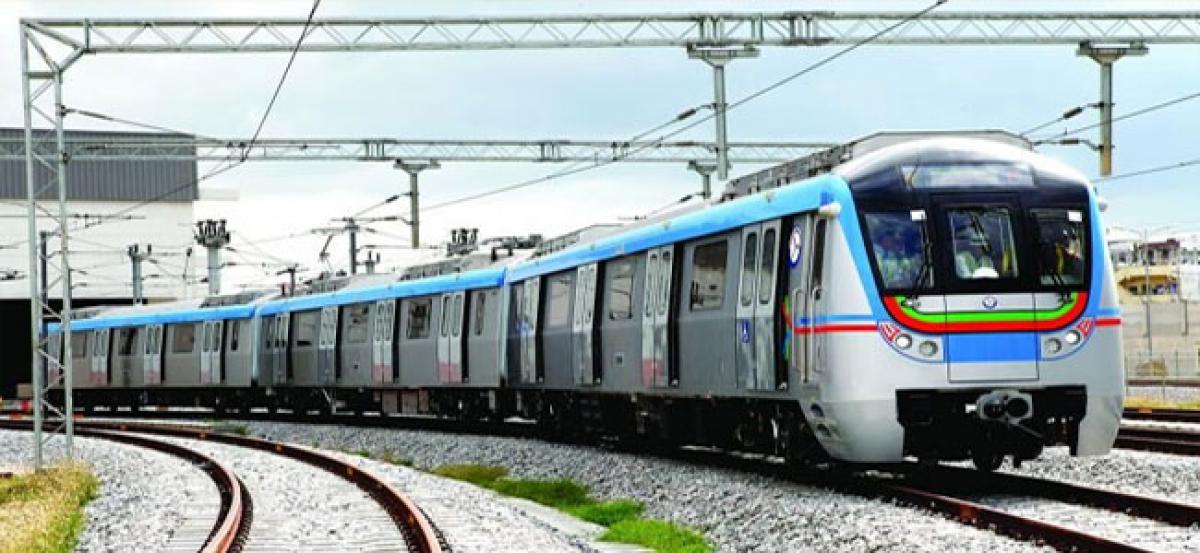Live
- Horoscope for November 28: Decoding Cosmic Clues for All Zodiac Signs
- Aishwarya Rai Bachchan’s Sister-in-Law Shrima Rai Shares Cryptic Post After Taking a Dig at Her
- Karnataka: Congress ministers indulge in lobbying ahead of Cabinet reshuffle
- Sujata joins duty after Odisha govt rejects leave extension
- Tur, urad prices have fallen in last 3 months: Govt
- NASA Alert: 130-ft Asteroid 2024 WQ2 Racing Past Earth at Over 62,000 km/h – Should We Be Concerned?
- What is UNSC Resolution 1701 and How it Relates to the Israel-Lebanon Ceasefire
- CM Mohan Majhi reviews preparedness at BJP state office ahead of PM Modi's visit
- Foods that boost the brain and sharpen memory
- Lisandro Martinez available for selection against Bodo/Glimt confirms Amorim
Just In
State says no to Centre’s Metro Rail policy, formulates its own


The state government is differing with Union government’s new Metro Rail policy and is formulating its own innovative model for successful implementation of Metro Rail projects in Vijayawada and Visakhapatnam. The government is of belief that the new policy, which has mandated public-private partnership, will not work out for low-density populated cities (below 20 lakh population) and is aimed to
Amaravati: The state government is differing with Union government’s new Metro Rail policy and is formulating its own innovative model for successful implementation of Metro Rail projects in Vijayawada and Visakhapatnam. The government is of belief that the new policy, which has mandated public-private partnership, will not work out for low-density populated cities (below 20 lakh population) and is aimed to decrease investment burden on Centre.
Highlights:
- Centre’s policy puts cost of civil works too in the ambit of private player
- State will bear cost of civil works under the PPP model
As the state government has prior information on Centre’s move towards new metro policy, Amaravati Metro Rail Corporation Ltd (AMRCL) has been working on a new model. But it is unsure on getting Centre’s assistance to the metro projects with the implementation of AP’s model.
As per the proposed new model of AP, State government will bear cost of civil works part that building of metro corridors, stations and other infrastructure. Remaining 50 per cent cost for O&M such as electrical, mechanical and other maintenance will be left to private partner. “It will easy to take up O&M part to private partners as the cost will be reduced by 50 per cent” AMRCL managing director N P Ramakrishna Reddy told The Hans India.
As per Centre’s new policy, public-private partnership (PPP) for entire project has been made mandatory for availing Centre’s grant for new metro projects. The policy stipulated a shift from the present “Financial Internal Rate of Return of eight per cent” to “Economic Internal Rate of Return (EIRR) of 14 per cent”. Besides, Centre’s grant has been reduced to 10 per cent.
In the old policy, Centre and State governments grant 20 per cent each of total project cost and remaining 60 per cent had to be obtained from private financial institutes. “If we procure the 10 per cent funds (Centre’s part), we can implement metro projects as per our wish” said a senior officer.
“The proposed PPP model will not be success. Private companies will not come forward to take up metro projects under the PPP model as huge amount must be spent for civil works. The new policy is aimed only to cut Centre’s funding to metro projects. In this scenario, we are preparing a model in which the state government will bear cost of civil works” said Ramakrishna Reddy.
Experts opine that the condition of 14 per cent EIRR will also be forced on state governments for manipulation as it is difficult to attain over 8 per cent EIRR. “Increasing losses to governments due to low EIRR of metro projects is one of the reason behind bringing the new policy,” added Ramakrishna Reddy.
“Centre is of the view that states see the metro projects as prestige to them and send DPRs for low-density populated cities such as Bhopal, Indore and Patna ignoring viability of the projects. Centre’s new metro policy may resist such kind of proposals,” said Ramakrishna Reddy.
By K Varaprasada Rao

© 2024 Hyderabad Media House Limited/The Hans India. All rights reserved. Powered by hocalwire.com






